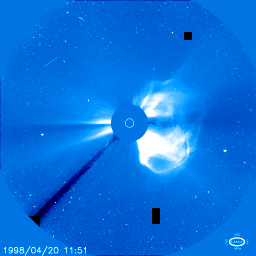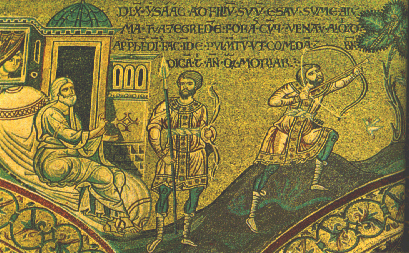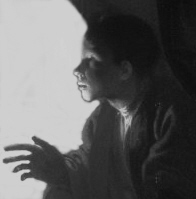Begun Tuesday, July 15th, 2003, 1am-2am.
Introduction: Naming the Baby Early Casual Researches: The Baby Seeks Answers. "Wandering in the Desert" Mahalath: Life as a wife... What the Hebrew Kabbalists say further. Mahalath: When a Wife becomes the Demoness In this new millennium it is rare that a person's name becomes a window to ancient times. Yet, I find my given name to be such a window. Christened by my father to be called Mahalah, the hospital made a typing error and re-christened me Mahala. The difference is subtle but significant which will be discussed further. For 34 years I was called Mahala (mah-HAY-lah) as a result of a clerical error.
Where would my father find such a name?
Over the years I asked key characters who possibly might know his motives. My mother answered:
"Your father gave me two choices, Starlac or Mahalah. I chose Mahalah because Starlac was a brand of powdered milk at the time."
And in fact Borden's Elsie the Cow had a powdered milk brand named Starlac that was popular in the 50's & 60's of the 20th century. In the 1960's Starlac powdered milk was found to contain salmonella and quietly removed from the grocers' shelves. My mother chose the mysterious Mahalah over the popular powdered dairy product. It seems in this scenario that Mahalah was the lesser of two evils.
"Get more nourishment for less money with Starlac: the heart of milk"My cousin Wanda in our very brief encounters stated plainly and absolutely that the name came from the Old Testament. For her this was an adequate explanation since she was a devout Primitive Baptist Christian. It was Wanda who informed me that the hospital had made a spelling error and left off the "h" at the end of my name. Mahala(h) even misspelled WAS a biblical name which should be a satisfying answer for any good Christian. In this scenario I should feel honored to bear a biblical name.
My father on the other hand had a more candid answer to my question:
"You were named after a very beautiful woman I knew in Seattle."
And the rest of this story went with him to his grave. If I am to believe the words of my father I am named after one of his lovers from the World War II era. This scenario provides me with the name of a co-sinner in an pre-marital affair (well only according to the Primitive Baptists in the family.)
Whether A, B, or C is the true story behind my naming the name Mahalah flitters in and out of the shadows of Ancient history. By researching it in honor of my jubilee year I have experienced a process of self-discovery and many sychronicities that lead in other directions of fascinating discovery. But my focus is on the history and potential of this name and somewhat less about my life experience as a bearer of this name.
Early Casual Researches: The Baby Seeks Answers.
All my life I have wondered about the origins of the Mahalah name. Who was the first person named Mahalah? Did she do anything extraordinary? Why is it such an unpopular name? For years there were no answers to these questions.
The most generic resources such as baby name books almost always listed Mahalah as being synonymous with Mahalia (mah-hayl-yah). The most common meaning given was that it was Hebrew and meant tenderness. Mahalia is associated with the American Spiritual singer Mahalia Jackson. These associations were disappointing as I seemed to be for most of my years musically handicapped and at all NOT tender! In other words I could not identify with my name. Mahalah did not seem to speak about who I thought I was.
In the early 1980's Native American Spirituality was gaining notice in the emerging "new age" counter-culture. Several indigenous medicine men reached out and shared their spiritual concepts with the conquering peoples of the North American continent. I found myself attracted to these concepts and learned as if on a vision quest.
This search ultimately lead to spending a weekend at a workshop in the Texas Hill country with Rolling Thunder (the Elder) and his warriors. One thing that stuck in my mind was Rolling Thunder's caution NOT to become a white indian but to explore your own cultural and spiritual roots.
This bit of advice marked a directional change in my life. As this may seem to diverge from the origins of the name Mahalah, it was during this last phase of my white indian days that I met Nakai Breen who was located in Bracketville, Texas. She was a Native American host who took my friend Lynn and me to meet a matriarch of the Kickapoo tribe who lived under a bridge on the banks of the Rio Grande River in Del Rio, Texas.
Nakai was also the first person to explain the unique meaning of my name in the Cherokee language. Over lunch in passing conversation she asked me how I acquired my name. She was impressed it was my given name. She stated that Mahalah with an "h" at the end means "the invisible energies around the Sun" or the corona.
After that revelation I embraced the new meaning and pronunciation of Mahalah and began a new relationship with my given name. It was another 5 years before I would officially add the "h" at the end and begin to change the pronunciation. In 1987 I began to leave Mahala (mah-hay-lah) behind and started to evolve into Mahalah (mah-hah-lah). This change coincided with the conception and birth of my daughter.
Where Mahala (mah-HAY-lah) made me cringe and uncomfortable, Mahalah (mah-hah-lah) seemed like a song of the heavens. While I did not consider myself tender or full of song, I did see myself as a navigator of the invisible energies whether around the Sun or on Earth.
I slowly developed a new circle of friends who knew me as Mahalah. And myself as Mahala fell into the past as memory except for close family and some friends who knew me when.
And one would expect that this new meaning is the end of the story except enquiring minds formulate more questions. With a closer look at Nakai's explanation of the meaning of Mahalah, two questions emerge:
1) How did the ancient Cherokees know about the Sun's coronal energies?
2) How did the corona (invisible energies) become known as Mahalah?
While these questions remain unanswered, I had a nagging idea there was more involved with this name than was apparent. It seemed to have its own invisible energies waiting for discovery.
"Coronal Mass Ejection"
07-16-03It was a long time before I researched cousin Wanda's biblical suggestions for the origins of Mahalah. After several casual attempts at Christian bible searches, it seemed Mahalah was all but obliterated from the pages of the bible. Mahalath (the biblical spelling) is known simply as a daughter of Ishmael who married Esau, twin bother of Issac
The Christians do not note where she is a good or bad woman. The whole story is centered around Esau's relationships with his family to include father-Isaac, mother-Rebecca, twin brother-Jacob and uncle-Ishmael. It's a typical story of patriarchal ethics and deeds running amok.
While this is not an essay about Esau, his story is important in understanding Mahalah's character evolution:
"Rebecca and Issac have twins and the Lord said unto her:
'Two nations are in thy womb, and two manner of people shall be separated from thy bowels;and the one people shall be stronger than the other people; and the elder shall serve the younger'.
The twin sons were Esau and Jacob both being as different as night and day.
'Esau was a cunning hunter, a man of the field; and
Jacob was a plain man, dwelling in tents'
(Gen 25:23,27)"As the story goes Issac favored the Elder Esau because of his hunting skills; and Rebecca favored Jacob because of the 'promise' the Lord made at the twins' birth. Rebecca resented that Esau would inherit Issac's birth right and she lured Jacob into conspiricies against Esau (with the Lord's blessing, of course!).
One day Esau returned from a hunt in the desert empty handed and famished. He entered Jacob's tent where Jacob had cooking a "mess of red pottage," which with a bowl of 'red pottage' Jacob cunningly bought starving Esau's birthright. After this purchase a life long conflict endured between the twin brothers.
From : Esau Selling His Birthright, Hendrick ter Brugghen,1626Much to the horror of Issac and Rebecca, Esau takes two Caananite women as wives. These women were considered to be pagan and idolaters. The scandal was so great that Esau packed up his belongings and wives and moved to an area called Mount Seir near the Dead (or Red) sea.
In his 74th year Esau made an attempt to regain his birthright by taking a third wife whose name was Mahalath who was allegedly a daughter of Ishmael (thereby making her a first cousin to Esau). Since Mahalath was non-canaanite Esau felt this marriage would make amends with his father, and perhaps help him regain his birthright.
This event resulted in Rebecca and Issac only seeing the elder son indulging in more excesses by taking yet another wife and they became enraged. In the end through a little chicanery on Rebecca and Jacob's part the blind and dying Issac gives his blessing to Jacob who is disguised as Esau. And the story seemingly ends there.
Mahalath in this story is depicted as a political pawn in a desert family dispute; or more correctly a trophy wife to gain the blessing and birthright from an ailing father.
In rabbinical and kabbalistic texts she is discussed in more detail and establishes her origins in ancient Egypt.It is important to note that at some point Mahalath bears a child named Igrat. Igrat is not commonly mentioned in the Christian traditions but is mentioned in Jewish traditions and plays an important role in the Kabbalistic traditions.
Often in Christian discussions one reads Mahalath as confused with Basemath. Some Hebrew texts attempt to clarify this confusion stating that Basemath daughter of Elon is called "Basemath because she use to burn spices as incense to idols" One rabbi further states,
Rashi on 36:3 Basemath, Daughter of Ishmael
But elsewhere (28:9) it calls her "Mahalath." We have found in the aggadic interpretation of the Book of Samuel, there are three whose sins are forgiven, one who converts, and one who ascends to greatness, and one who marries a woman. And the source for the last is derived from here. This is why she is called "Mahalath," because when Esau married her, his sins were forgiven.[Mahalath is related to mahal, forgive].This comment suggests that the name Mahalath can be a title. Essentially Mahalath was Esau's dispensation card with his family (& religion) which we know was a plan that failed.The problem seems centered around Mahalath's ancestry.
She has already been associated with insence and idolatry which suggests she practiced the "old religion." The "old religion" was found in the Temples of Egypt. Ironically ANYTHING associated with Ancient Egypt(unless declared bad and sinful)is unacceptable in Christian/Jewish traditions. This is an incredible act of denial since recent studies of Ancient Egypt reveal many Egyptian customs are found in Ancient Hebrew traditions which filtered into Christianity.
What the Hebrew Kabbalists say further.
The Kabbalists tell the next level of this woman's heritage. Mahalath's mother was a "daughter of Kasdiel the Egyptian Sorcerer." Ishmael's mother procured Kasdiel's daughter as a wife for her son.
Ishmael's father Abraham (or Abra-ham) disapproved of the marraige (for unstated reasons) and advised Ishmael to divorce Kasdiel's daughter which Ishmael did.
Ishmael's ex-wife leaves and returned to the desert, but she was pregnant with Mahalath. The mother and the daughter remained in the desert "practicing many socereries." As the years passed Mahalath matured into a beautiful woman who attracted the attention of that area's desert spirit named Igratiel.Igratiel and Mahalath bore a daughter named Igrat who also learned the way of "socerery."
At some point Mahalath leaves the desert and leaves Igrat behind to live with her grandmother. There is a conflict in the texts as to Mahalath's fate: one tradition states she marries Esau, stays with him and produces no children. Then another tradtion states she marries Esau, has Igrat, but then at some point leaves him to return to the desert taking Igrat.
Again one might think this story ends here; however what happens next in Mahalath's story supports the second tradition. Mahalath and daughter reappears in the desert leaving Esau and his household to its own designs. And the mother and daughter's deeds takes a turn towards legend.
07-25-03
Mahalath: When a Wife becomes a Demon Queen
In the Talmudic and Kabbalistic traditions Mahalath steps over to the Dark Side of legend and lore. Mahalath and Igrat resurface as two of the four queens of the demons who are Lilith, Nega(Igrat), Mahalath and Naamah. It is not clear why Mahalath and Igrat are included in this group and the stories about them are often conflicting but they contain enough similarities to piece together their exploits.
The Queens ruled over the four Tequfot or the equinoxes and solstices. It isn't clear which Tequot (meaning orbit/course) is assigned to which queen, but certain details and attributes may point the direction and will be discussed later. The Tequfot are:
TEVET Winter Solstice NISAN Vernal Equinox TAMMUZ Summer Solstice TISHRI Autumnal Equinox Each Queen was assigned regions by Samael, the Great Demon, king over all demons (the four Queens being referred to as Samael's concubines). These regional assignments were:
LILITH Kingdom of Damascus,House Rimmon,Rome NAAMATH Kingdom of Tyre (opposite the land of Israel) MAHALATH Kingdoms of Granata(Granada)& Ishmael, Egypt IGRAT Kingdoms of Malta (also called Rhodos) Also bedeviling responsibilities were assigned to each queen:
LILITH fornicates with all men and strangles children because she can not bear her own NAAMATH fornicates only with gentiles MAHALATH sets out to do harm on the nights preceding the Sabbath and Wednesdays IGRAT fornicates only with Israel ("12 tribes") The stories of the four queens are conflicting and abbreviated. For the purpose of this essay only Mahalath and her daughter Igrat will be discussed.However it is important to be aware of the familial relationships of these four women.
Lilith is considered to be the wife of Samael; and Naamath is often called Lilith the Maid or Lesser Lilith and is Elder Lilith's granddaughter. Igrat is Mahalath's daughter. These stories suggest a succession of women in two separate familes who ruled over the orbits and courses of the heavens and over a large portion of the lands that today we call the Holy Land.
Returning to the desert Mahalath assumes command of 478 legions of demons including some who flew through the air. The size of her 'military' compliment is determined by the gematria of her name 478.(Lilith commanded 480 legions of demons.)With her legions she harrassed and did harm to the tent people (presumably Hebrews) on Wednesdays and nights preceding Sabbaths,and instructed her "destroying angels to go forth, and each had permission to wreck distruction independantly."
Mahalath had direct contact with the desert peoples in this Talmudic writing:
On one occasion she(Mahalath) met R. Hanina b. Dosa [and] said to him, 'Had they not made an announcement concerning you in Heaven, "Take heed of Hanina and his learning," I would have put you in danger.' 'If I am of account in Heaven,' replied he, 'I order you never to pass through settled regions.' 'I beg you,' she pleaded 'leave me a little room.'
Christian and Judaic theologians often site this somewhat civil exchange as an example that demons are seeking "populated lands" for some demonic agenda. But another way of looking at this is that a commander of 478 legions was on campaign between point A and point B and has been cautioned about passing through a regional governor's domain without permission. The question is; do demons normally operate according to diplomatic protocol?
One of the most often sited attributes of Mahalath is her abilities to communicate with God and Heaven and speak in the Holy Tongue. Mahalath "goes and sings in the Holy Tongue songs and paens." And others wrote that that:
"...husk (ie demoness {Mahalath}) is called Meshullahel {Messenger of God}, and the reason is that she sends out evil angels."
Mahalth's name is associated with two psalms:
53--Mahalath
Both of these Psalms speak of afflicion, iniquity, desertion and darkness all suggesting human behaviour towards the End Times.
Several writers say that a confrontation between Lilith and Mahalath occurs at the End of Time:
"...And when the two meet on the Day of Atonement they quarrel there in the desert. They strive, the one with the other, until their voices rise up to heaven, and the earth shakes with their clamor. And all this is brought about by the Holy One, blessed be He, so that they should not accuse Israel while they [Israel] pray."
Some writers tell how Lilith will stand in Rome
and Mahalath will stand in Egypt and engage in a screeching match that will surround the Earth in a clamor/sound/song and so begins the End of Time or
the Day of Atonement.
More to come--Demi-Demon Conclusions
Note to Self
This is part of my magickal journey. My name Mahalah is in itself inherently magickal but for most of my life I've considered it a curse. Often mispronounced, not remembered and bastardized bearing the name Mahalah is not an easy task. My current research has lead me into new insights of self-discovery based on this name. My recent personal insights will be included at the end of this essay as a personal guide for my continuing journey.




